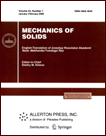 | | Mechanics of Solids
A Journal of Russian Academy of Sciences | | Founded
in January 1966
Issued 6 times a year
Print ISSN 0025-6544
Online ISSN 1934-7936 |
Archive of Issues
| Total articles in the database: | | 13427 |
| In Russian (Èçâ. ÐÀÍ. ÌÒÒ): | | 8178
|
| In English (Mech. Solids): | | 5249 |
|
| << Previous article | Volume 42, Issue 1 / 2007 | Next article >> |
| A. M. Akhtyamov, A. V. Muftakhov, M. Taikher, and L. S. Yamilova, "On a method for determining the fixing conditions for a rectangular plate from the natural frequencies," Mech. Solids. 42 (1), 85-96 (2007) |
| Year |
2007 |
Volume |
42 |
Number |
1 |
Pages |
85-96 |
| Title |
On a method for determining the fixing conditions for a rectangular plate from the natural frequencies |
| Author(s) |
A. M. Akhtyamov (Institute of Mechanics, Ufa Branch of the Russian Academy of Sciences, pr-t Oktyabrya 71, Ufa, 450054, Russia, AkhtyamovAM@mail.ru)
A. V. Muftakhov (Department of Mathematics and Statistics, Bar-Ilan University, 52900 Ramat Gan, Israel, muftahov@yahoo.com)
M. Taikher (Department of Mathematics and Statistics, Bar-Ilan University, 52900 Ramat Gan, Israel, teicher@macs.biu.ac.il)
L. S. Yamilova (Bashkir State University, Frunze 32, Ufa, 450007, Russia, yles@mail.ru) |
| Abstract |
We prove the duality of solutions for the problem of determining the boundary conditions on two opposite sides of a rectangular plate from the frequency spectrum of its bending vibrations. A method for determining the boundary conditions on two opposite sides of a rectangular plate from nine natural frequencies is obtained. The results of numerical experiments justifying the theoretical conclusions of the paper are presented.
Rectangular plates are widely used in various technical fields. They serve as printed circuit boards and header plates, bridging plates, aircraft and ship skin, and parts of various mechanical structures [1–4]. If the plate fixing cannot be inspected visually, then one can use the natural bending vibration frequencies to find faults in the plate fixing. For circular and annular plates, methods for testing the plate fixing were found in [5–7], where it was shown that the type of fixing of a circular or annular plate can be determined uniquely from the natural bending vibration frequencies. The following question arises: Is it possible to determine the type of fixing of a rectangular plate on two opposite sides of the plate from the natural bending vibration frequencies if the other two sides are simply supported? Since the opposite sides of the plate are equivalent to each other, a plate with "rigid restraint-free edge" fixing will sound exactly the same as a plate with "free edge-rigid restraint" fixing. Hence we cannot say that the type of fixing of a rectangular plate on two opposite sides can be uniquely determined from its natural bending vibration frequencies. But it turns out that we can speak of duality in the solution of this problem. Here we observe an analogy with the problem of determining the rigidity coefficients of springs for elastic fixing of a string [8]: the rigidity coefficients of the springs are determined by the natural frequencies uniquely up to permutations of the springs. |
| References |
| 1. | W. Strutt (Lord Rayleigh),
The Theory of Sound, Vol. 1
(Macmillan, London, 1926; Gostekhizdat, Moscow-Leningrad, 1940). |
| 2. | I. V. Anan'ev and P. G. Timofeev,
Vibrations of Elastic Systems in Aircraft Structures and Their Damping
(Mashinostroenie, Moscow, 1965)
[in Russian]. |
| 3. | V. S. Gontkevich,
Natural Vibrations of Plates and Shells
(Naukova Dumka, Kiev, 1964)
[in Russian]. |
| 4. | V. V. Bolotin, Editor
Vibrations in Technology.
Handbook in 6 Volumes. Vol. 1.
Vibrations of Linear Systems,
(Mashinostroenie, Moscow, 1978)
[in Russian]. |
| 5. | A. M. Akhtyamov,
"Is it possible to determine the form of fixing
of a vibrating plate from how it sounds?"
Akust. Zh.
49 (3), 325-331 (2003). |
| 6. | A. M. Akhtyamov,
"Determination of Fixing of an Annular Plate
from Its Natural Frequencies,"
Izv. Akad. Nauk. Mekh. Tverd. Tela,
No. 6, 137-147 (2003)
[Mech. Solids (Engl. Transl.)]. |
| 7. | A. M. Akhtyamov and A. V. Mouftakhov,
"Determination of Boundary Conditions from Natural Frequencies,"
Inverse Probl. Sci. Eng.
12 (4), 393-408 (2004). |
| 8. | A. M. Akhtyamov,
"On Uniqueness of the Solution of the Inverse Spectral Problem,"
Differentsial'nye Uravneniya
39 (8), 1011-1015 (2003). |
| 9. | V. A. Yurko,
Inverse Spectral Problems and Their Applications
(Izd-vo Saratov Ped. Inst., Saratov, 2001)
[in Russian]. |
| 10. | P. Lancaster,
The Theory of Matrices
(Acad. Press, New York-London, 1969; Nauka, Moscow, 1982). |
| 11. | B. Ya. Levin,
Distribution of Roots of Entire Functions
(Gostekhizdat, Moscow, 1956)
[in Russian]. |
| 12. | M. M. Postnikov,
Lectures on Geometry. Linear Algebra, and Differential Geometry
(Nauka, Moscow, 1979)
[in Russian]. |
|
| Received |
12 January 2005 |
| Link to Fulltext |
|
| << Previous article | Volume 42, Issue 1 / 2007 | Next article >> |
|
 If you find a misprint on a webpage, please help us correct it promptly - just highlight and press Ctrl+Enter If you find a misprint on a webpage, please help us correct it promptly - just highlight and press Ctrl+Enter
|
|

 Russian
Russian  English
English